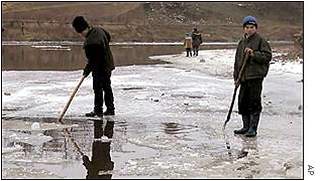(Source: http://www.clayton.edu)
Compensation
The Transgold company still did not pay compensation except some compensation for the directly effected village of Bozinta Mare. Especially the fishermen in Hungary who lost all their income did not get any compensation. Some of these fishermen are still in a court case, but their chances are low as at the time of the accident international liability law was enforced. The company refused to pay voluntarily claiming that all of their activities were permitted by the Romanian authorities.
Tisza River today
As there were no new accidents for the last years, the Tisza River could slowly recover. Some fish survived the cyanide spill in branches. Today the number of fish is close the number of fish before the accident, but there are still less species, commercial fishing still is not possible. The Tisza River is also suffering from a ongoing pollution with mining and other industrial waste waters.
***
The Baia Mare accident has become one of the classic situations in the mining industry, acknowledged by industry, professionals and non-government organizations (NGOs) as something from which we can all draw important lessons.
While it is difficult to imagine a world without mining, it is imperative that people begin to rethink what they need to take from the earth. In the process they should redefine the acceptable risks in doing so. More sustainable forms of mining are available these days, but companies are unwilling to invest in these more expensive technologies because of reduced profits. So the question quite simply is “What is more important to humanity’s survival: material wealth or the health and welfare of the world’s ecosystems that sustain us all, regardless of where we live?” With this perspective in mind, making and supporting the “right” decision becomes easier.

